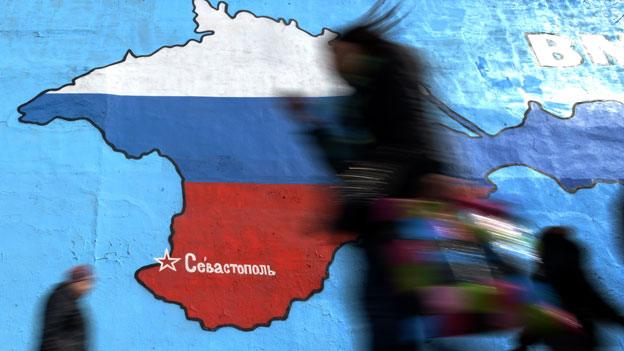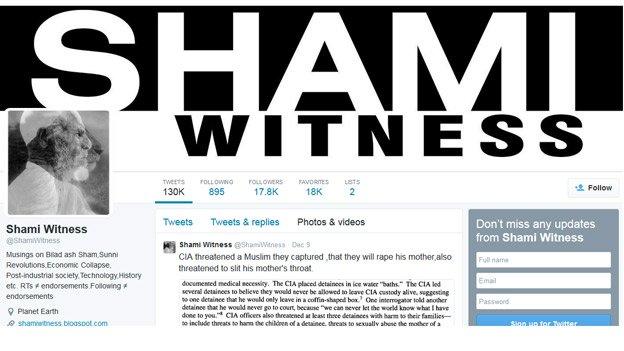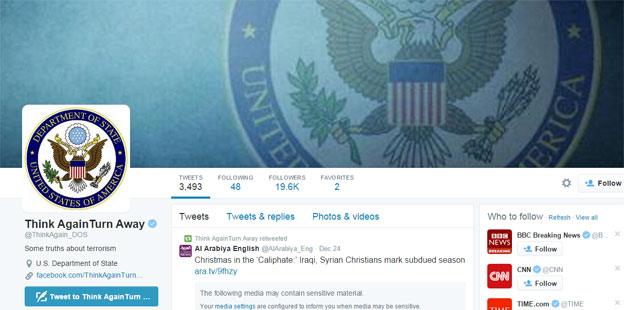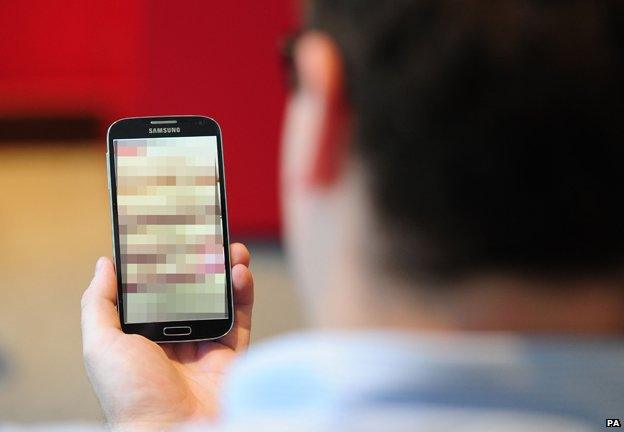The big ideas of 2014: Part II
- Published

A slew of big ideas were debated in 2014. Talk of a "new Cold War", battling the Islamic State online and the establishing of "revenge porn" as a crime were among them.
Part I - with the first three ideas - can be seen here. Parts three and four will follow later.
4. The Return of the Cold War
In 2014 the Cold War headlines rained down. "A new Cold War?" asked USA Today. For the New York Times, external, it was "The Risk of a New Cold War", while the Daily Telegraph went with "Cheap oil will win new Cold War with Putin - just ask Reagan". The Guardian wondered "The new Cold War: are we going back to the bad old days?"
It wasn't just Western journalists - former Soviet leader Mikhail Gorbachev warned, external that the world was on "the brink of a new Cold War".
There's been a lively debate as to whether the term Cold War is really apposite. Foreign Affairs "Managing the new Cold War" concluded it was, external: "The hard reality is that whatever the outcome of the crisis in Ukraine, Russia's relations with the United States and Europe won't return to business as usual, as they did after the 2008 Russian-Georgian war."
There has been tension between Russian and the West for a while. But 2014 was different. This was the year when tension turned into Russian boots on the ground. The immediate trigger was the political unrest in Ukraine.
When in November 2013 President Viktor Yanukovych refused to sign an agreement with the European Union there were widespread protests. It culminated in February 2014 when Yanukovych was removed from power. That in turn set off a chain of counter demonstrations in Russian-speaking parts of the south and east of the country. These escalated into an armed insurgency. Crimea was annexed by Russia and a bloody conflict rumbles on in the east.
John Simpson put the Crimea annexation into the context of three Soviet invasions - Hungary in November 1956 and Czechoslovakia in August 1968, when the Communist governments there began showing dangerously Western tendencies; and Afghanistan in December 1979, when the pro-Communist regime was on the point of collapse. But Crimea was "an infiltration, not an invasion". "It was over before the outside world realised it had even started."
In July came the crash of Malaysian Airline flight MH17. All 298 people on board died after the airliner crashed in eastern Ukraine, close to the border with Russia. Western nations said there was growing evidence that the plane was hit by a Russian-supplied missile fired by rebels. Russia blamed Ukrainian government forces.
And Russia has been accused of sabre rattling. Russian incursions to European airspace reached dangerous levels, a London think tank reported, external. And in one incident Russian warships entered the English Channel.
But there have also been those - like economist Jeffrey Sachs, external - who believe that a stable solution to the latest strife should involve acknowledging the ways Russia feels it has been provoked. The idea of Nato troops right on Russia's borders has always been seen as threatening.

Russia sanctions

The US and EU imposed sanctions on Russian individuals and businesses in response to the annexation of Crimea and the crisis in eastern Ukraine
The deaths of 298 people on board a plane destroyed over eastern Ukraine in July triggered tougher EU sanctions
Between March and December, lists of individuals and companies hit by travel bans and asset freezes were published
Key sectors of the Russian economy closely connected to the ruling elite have been targeted
Russian state banks are excluded from raising long-term loans
Exports of dual-use equipment for military use in Russia are banned and future EU-Russia arms deals are banned. Exports of some oil industry technology and services are banned, though gas remains unaffected

There are strong differences with the Cold War, says Andrew Monaghan, a senior research fellow at think tank Chatham House. The ideological divide is no longer a chasm between communism and capitalism. Russia is not expansionist in the same way as the Soviet Union, he argues. And while its government is authoritarian, it is still a democracy with a far freer media than in Soviet times. He sees the problem as bigger than Ukraine. It is really a different way of looking at sovereignty and the balance of power between Nato, the EU and US on the one side and Russia and its supporters on the other.
The big reason this year saw all the talk of Cold War was that Europe had a war going on again. It had been there in the 1990s with Yugoslavia. But what made this different, argues Timothy Garton Ash, professor of European Studies at Oxford University, was the involvement of soldiers from a great power - Russia. "It came about because Putin is not prepared to allow Ukraine, which he sees as the cradle of Russian nationhood, leaving the Russian sphere of influence. The West didn't cause the war but they contributed to it by sending mixed signals."
But the Cold War is a pretty misleading term, Garton Ash argues. There are more similarities now with the pre-1914 world of several great powers than the 1964 world of Russia versus the US, he believes. Yes, Putin is a former KGB officer who'd like to see the return of Soviet power. But there is no Soviet bloc. And the underlying structure of world politics has changed. Today the world is not bi-polar but multi-polar with India and China. Or you could argue "no polar" with no dominant powers, suggests Garton Ash.
5. Fighting the Islamic State online

After the killing of Drummer Lee Rigby in south London last year, Prime Minister David Cameron vowed to "drain the swamp" that allows Islamic extremism to breed. Much of that breeding ground is online.
And in June 2014 Downing Street said that since December 2013 about 15,000 items of jihadist propaganda, external had been removed from the internet.
There have always been propaganda battles for hearts and minds. But today the biggest propaganda battle relates to Islamic State and other jihadists. And the battlefield is the internet.
In August the New York Times dubbed IS's sophisticated approach to social media as Online jihad 3.0.

The pro-IS account, which has since been shut, had almost 18,000 followers
The technology has changed massively. Social media today has a far greater reach and speed than even 10 years ago when beheading videos were being made in Iraq.
Beheading videos are still being made and watched by greater numbers. But there are also more polished and subtle tools being used on social media by Islamic extremists.
The New York Times pointed out, external how IS uses dozens of Twitter accounts, posts speeches in many different languages, and borrows techniques from video games and television dramas. "When its accounts are blocked, new ones appear immediately. It also uses services like JustPaste to publish battle summaries, SoundCloud to release audio reports, Instagram to share images and WhatsApp to spread graphics and videos."
The fighting may be going on in Syria. But the battle has been brought into UK homes, said Ch Supt Clarke Jarrett, who runs Scotland Yard's Counter-Terrorism Internet Referral Unit (CTIRU). 'It is very graphic and because of the internet it can reach people's homes, their bedrooms, their phones very quickly."
The CTIRU team at Scotland Yard searches the internet to find material that may incite terrorism, such as bomb making instructions or beheading videos.
Suspicious material is relayed to the Crown Prosecution Service. The CPS then weighs up whether it meets the UK legal threshold - the encouragement or glorification of terrorism. If it is found to be in breach of UK law, social media firms are asked to remove the material. Since February 2010, more than 49,000 pieces of content have been taken down, more than 30,000 of that in the last year.

In the US, the State Department has tried to engage with jihadists by responding to IS tweets and posts. It has a twitter account called Think Again Turn Away. When an IS fighter calling himself Abu Turaab tweeted "For those who want to come but are facing obstacles, be patient and keep the desire for Jihad alive within you always" it responded: "ISIS recruits' 2 choices: commit atrocities & die as criminals, get nabbed and waste lives in prison." This approach has not generally been followed by the UK.
There are free speech concerns. The government wants technology firms to help it take down content and also inform law enforcement agencies of terrorist-related material. But after the Edward Snowden episode, tech firms are said to be nervous about the perception they might be spying on people.
6. Revenge Porn
The idea of sharing explicit images of someone without their permission on social media or pornographic websites - typically carried out by ex-partners - has long been viewed as deeply unpleasant. But attitudes have become crystallised in 2014 with the expression "revenge porn" going mainstream. When not circulated by an ex-partner to cause embarrassment, the images or videos have often been stolen by hackers. Sometimes they are the subject of blackmail attempts.
Danielle Keats Citron, professor of law at the University of Maryland School of Law, has been writing about online harassment since 2007. But 2014 was a tipping point, when revenge porn entered the language as a new kind of crime. She prefers the term "invasion of sexual privacy", although despite the nomenclature she welcomes the media's coverage.

Victims used to be told to "turn your computer off - boys will be boys", Keats Citron says. But all that changed. The journey has been similar in the US and UK. Brave victims have come forward to campaign against it. Suddenly the full extent of their trauma has been revealed. Victims can lose their jobs, be humiliated on Facebook and be subject to threats. There was already debate in the media in the first half of the year. But it was really the hacking of celebrities at the end of August that ensured the world took notice, external.
Hundreds of images of mostly female celebrities were circulated after hackers broke into iCloud accounts. Those hacked included Jennifer Lawrence and Kate Upton.
Lawrence was perhaps the most forceful on the nature of the crime - emphasising that anyone who sought out the images was also violating privacy. "Anybody who looked at those pictures, you're perpetuating a sexual offence. You should cower with shame."
Celebrities helped to make the issue so prominent. But some noted that it was easy to overlook that ordinary women have also often been hacked and put on to the same websites.

Naked pictures of Jennifer Lawrence were leaked in the summer
In October, the Sun launched a campaign, external with the headline "Jail ex maniacs".
And there was the battle against Hunter Moore who ran the site IsAnyoneUp by campaigners such as Charlotte Laws. Her daughter had taken a topless selfie. She hadn't shared it. She hadn't shown it to anyone but had sent it from her phone to her computer. But her account was hacked and the picture appeared on Moore's site and on the victim's Facebook page. She was warned, external she could lose her job.
Laws says that when she first began campaigning victims wanted to remain anonymous: "This was understandable, but it made it appear that revenge porn was not a problem. As time progressed, brave souls went public."
Now policy-makers and law enforcement bodies are taking notice.
Legally, what is happening is something similar to the way stalking became a crime in the early 1990s, says Keats Citron. California was the first to bring in an anti-stalking law in 1990. Within three years every state in the US had one.
California brought in the first law against revenge porn in October 2013. There are now 14 states with laws against invasions of sexual privacy. A law is pending in 20 others.
In the UK, revenge porn will be made a specific offence, external.
This is a new type of crime and needs legislation, Keats Citron says. The old way to tackle this kind of behaviour would be sexual harassment laws she says. But this approach needs to be able to show persistent, repetitive behaviour. Whereas revenge porn needs just one action for the harm to be done.
Google trends: Interest in the term 'revenge porn' in past 10 years

At the tail end of 2013 California's attorney general Kamala Harris announced the arrest, external of website operator Kevin Christopher Bollaert.
Earlier this month Noe Iniguez was sentenced to a year in jail after posting a photograph of his ex-girlfriend naked to her employer's Facebook page alongside derogatory comments.
In March next year Hunter Moore's trial begins. It will give a clearer idea of how seriously revenge porn is being taken by the courts. For Laws, 2014 has been a year of progress. But more needs to be done. "When a comprehensive federal law is in place, we can declare victory."

More from the Magazine

Hollie Toups remembers in vivid detail the day that changed her life. The 33-year-old Texan was at work when a friend called to tell her there were naked pictures of her on a website. "I was in tears for days," she says. She was afraid to leave the house, and when she eventually did, she was approached several times by men who had seen the photos. Working with investigators, Toups and a number of other women, managed to get one site shut down after discovering a number of potential violations of the law.
Subscribe to the BBC News Magazine's email newsletter to get articles sent to your inbox